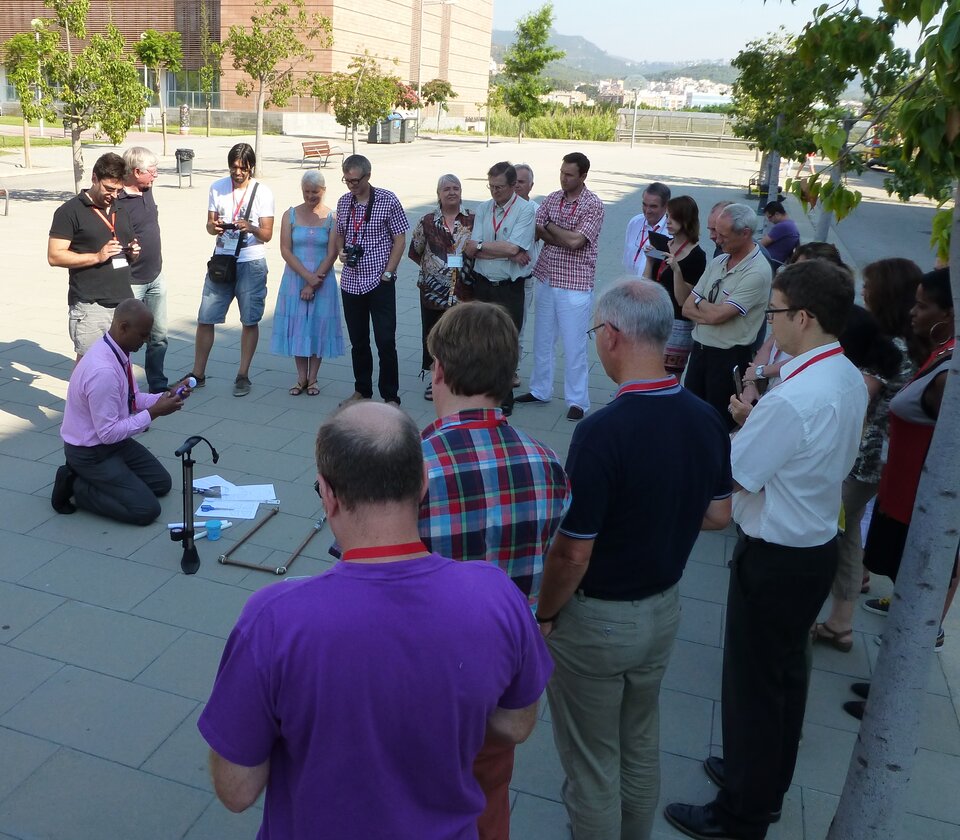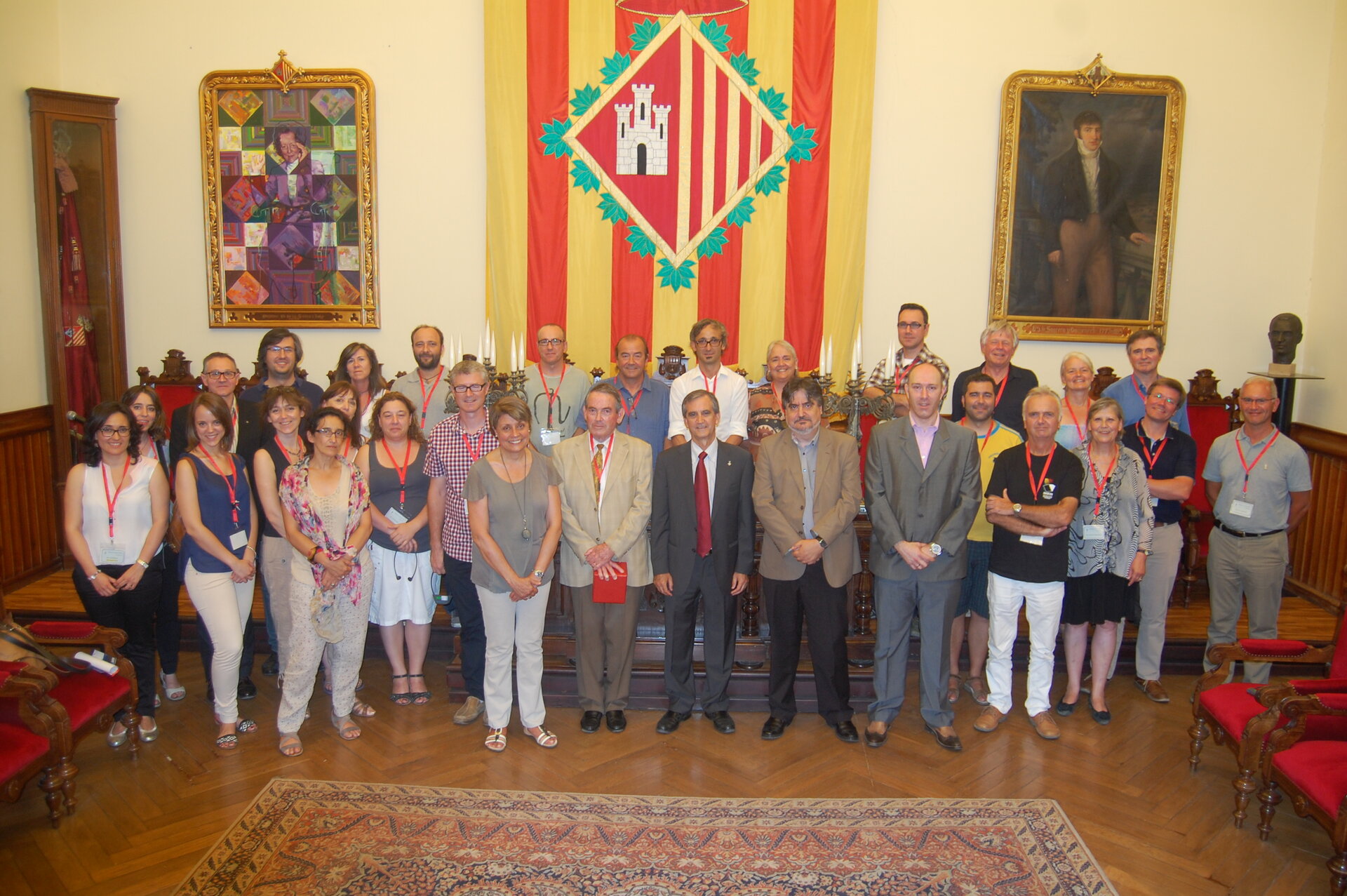When space met education in Terrassa, Spain
For four days in July, twenty-six secondary school teachers and headteachers took part in the sixth REVA seminar. The enthusiastic participants learned about European access to space and the exciting career prospects it presents for their students.
The seminar took place in the Ariane City of Terrassa, near Barcelona, Spain, and was organised by the Community of Ariane Cities (CVA) and the City of Terrassa with the participation of the City of Castelldefels. The seminar is part of the REVA (Ariane Cities Educational Network) programme, which is jointly organised by CVA and ISSAT (Institute for Space, its Applications and Technologies). The attendees learned about space transportation with a particular focus for this year on launch operations.
The main aims of the seminar and more generally the REVA programme are to motivate school students about science and technology and to steer them towards considering careers in Europe’s space industry. This ensures Europe’s continued expertise in space technology, benefiting us all.

“We hope that the teachers will use the experience to encourage young people to choose careers in space,” says REVA Programme Manager Philippe Noël, ISSAT/CVA.
The CVA is a network of twenty cities that have space firms and academic institutions working on European launch vehicles and infrastructures. All cities belong to Member States of the European Space Agency (ESA). All cities except one are located in Europe. The exception is Kourou, French Guiana, where Europe’s spaceport is located.
There were teachers and headteachers from twelve European cities present in Terrassa. The seminar allowed them to meet space professionals as well as each other. The professionals informed them about the latest developments in Europe’s access to space and launch operations, while special sessions allowed them to exchange ideas and successful methods for teaching about space in the classroom.

Many of the teachers have already developed space projects in their schools individually and have participated in other space education seminars. This event provided them with increased knowledge of space issues and additional tools and introduced tested experiments that they said they would explore with their students.
“These teachers would not have given up their time if they were not already passionate about space. They are among the leading space educators in Europe,” says Anu Ojha, Director of the National Space Academy, National Space Centre, UK, who ran some of the workshops at the seminar on behalf of ESA.
This was the sixth time that the REVA seminar has been run. Each year it takes place in a different Ariane city. Sessions included a presentation on the future of European space transportation from Eric Louaas, Senior Project Manager in the Directorate of Launchers, CNES, and an overview of ESA’s Education activities for teachers given by Clara Cruz Niggebrugge from ESA’s Education Office.
The seminar benefited from a visit to Spanish aerospace firm GTD, Barcelona, which specialises in onboard software capabilities. There, the participants watched computerised launch simulations to understand the split-second decision-making that goes into these events.

The teachers also visited the School of Industrial and Aeronautic Engineering of Terrassa, (ETSEIAT) and the Castelldefels School of Telecommunications and Aerospace Engineering (EETAC). Both are part of the Universitat Politècnica de Catalunya (UPC Tech), Barcelona.
In Terrassa, the President of Spaii Edutainement, Xavier Alabart Lopez, showed the teachers how to simply design a landing craft and in Castelldefels, university students from the ETSEIAT Euroavia association, showed them how to demonstrate the principles of rocketry by making their own water-filled rockets and launching them. “You can use these simple experiments and make the work around them as simple or as advanced as you want,” says Ojha, emphasising that this makes them perfect for the classroom. “You don’t necessarily need expensive equipment to generate sophisticated educational outcomes,” he says.
The teachers will now take the experience and knowledge back to the classroom to prepare their students not just for life in the technological Europe of the future, but also for exciting careers in the space industry where they will be able to help develop and maintain Europe’s technology, scientific expertise and know-how.
Notes for editors:
About REVA
REVA (Educational Network of Ariane Cities), is a programme set up by the CVA (Community of Ariane Cities) with the support of the ISSAT Association (Institute for space, its applications and technologies) aiming to encourage educational exchanges relating to space activities, especially space transportation, within the CVA network. In this context CVA organises annual seminars to give middle and high school teachers in member and non-member cities of the CVA the opportunity to attend training in space related topics. This is extended to scientific mentors at the appropriate level of ability. Seminars are organised in collaboration with local authorities, industry and academic and research institutions.




